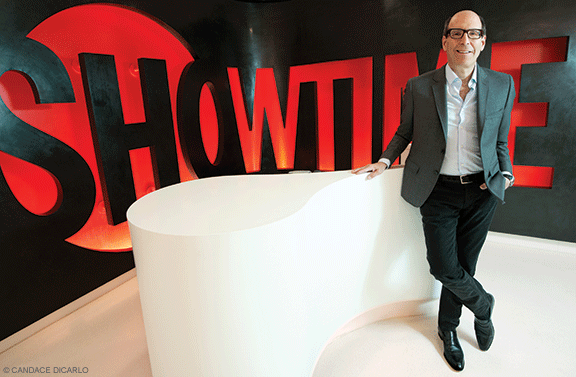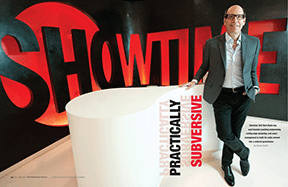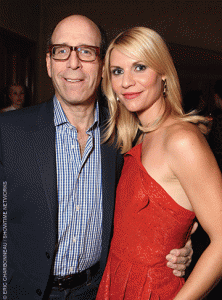
Showtime CEO Matt Blank has used boundary-pushing programming, cutting-edge marketing, and smart management to build his cable network into a national powerhouse.
BY SUSAN KARLIN | Photography by Candace diCarlo

He seems too … normal.
This slim, understated, affable man speaking in tight, corporate phrases—monetizing the brand, high-impact environments—this can’t be the guy whose whimsical vision has turned Weeds’pot-dealing suburban mom, Dexter’s vigilante serial killer, and Homeland’s bipolar CIA agent into TV heroes. Can it?
Yet Matt Blank W’72, the CEO of Showtime, has more in common with his network than his conventional appearance suggests.
“I have a term that describes our brand, shows, and lead characters, and that’s subversive,” says Blank. “But they’re subversive in a way that makes people want to root for them. Who would think that you’d be rooting for a serial killer—for seven years now? Most of our lead characters are living right on the edge of respectability, or way over the line. But the shows tend to be fairly high-concept, which makes it easier for people to embrace.”
Blank’s personal subversion takes a slightly different form. It has more to do with taking risks and following instinct over expectation: pursuing a finance major during the countercultural ’60s, choosing a media career while his classmates opted for banking, twice leaving established companies for fledgling startups, and developing an open management style that sparks creativity—and profits.
Since joining in 1988 and becoming CEO in 1995, Blank has grown Showtime Networks Inc. from three premium networks—Showtime, The Movie Channel, and Flix—into a company that now provides 45 digital multiplex feeds. Along with Smithsonian Networks (a joint venture with the Smithsonian Institution) and the CBS Sports Network (which Blank does not oversee), the company contributed $1.8 billion in cable revenues to owner CBS last year. Creatively, Showtime cemented its formidability when Homeland, whose lineup included Meredith Stiehm C’90 as writer and executive producer, swept last year’s Emmy Awards. (For more on her see page 75.)
To survive and triumph in such a competitive and volatile industry requires a number of highly refined talents. One is an ability to gauge long-term potential in emerging technology. Another is identifying and hiring talented executives—then staying out of their way.
“Matt runs the company in a very collegial way—he sets a tone among top managers of cooperation, congeniality, and loose boundaries that really works in a creative business,” says David Nevins, Showtime’s president of entertainment. “It helps create a sense of, ‘That’s a club that I want to belong to.’ He stays focused on the big picture, maintaining the integrity of the brand and growing its exposure. Matt is very savvy at this combination of programming and marketing that keeps Showtime in the top of people’s minds.”
A cold November rain slams against the windows of Blank’s Manhattan office. Sixteen floors below, pedestrians huddle against the elements as they make their way along Broadway and 50th Street.
Inside tells a very different story. Blank is unfazed by the weather, his workspace buzzing with efficiency and purpose. It’s spacious and sleek; no show tchotchkes clutter the shelves. There’s a large computer monitor on a tidy desk at one end, a coffee table with a couch and chairs for casual meetings at the other. It’s about as far from Hollywood flash and celebrity as you could imagine.
Blank settles into one of the chairs. Quietly energetic, he looks considerably younger than his 63 years, and manages his time with an enviable discipline. He’s been awake since 6 a.m., with a workout, show-footage screenings, and a handful of impromptu staff meetings already in the rearview mirror. The office hums like a well-oiled machine, thanks to a handpicked team of senior managers, many of whom have worked for Blank for two decades.
“We operate very informally,” he says. “I hate to come in in the morning and see my day booked every hour or half-hour. I’d rather someone who worked for me just called and I’d say, ‘Come down now and we’ll meet for 15 minutes.’ It’s quicker, more efficient, and I have more control in what my day is like.
“The one consistent thread is finance,” he adds. “I’m very financially oriented, and CBS [which owns Showtime] is a very financially oriented company. We like to make our numbers; we like to exceed our parent company’s expectations.”
Working meals are the norm: lunches with staff or industry folks; evenings at screenings or business dinners. Beyond Showtime, Blank is involved with numerous media and non-profit organizations, serving on the directing boards of the National Cable Television Association and The Cable Center, an industry educational arm. Then there are the frequent trips to Los Angeles.
“I’m an active person,” he adds. “I like a long day with a lot of different things going on. I think if I sat in a room and did one thing all day, I’d get frustrated.”
Before Blank began redefining the Showtime brand with a revised programming slate in the middle of the last decade, he used to hear some annoying misattributions. Things like,“I was watching Weeds on HBO.”
Oddly, the explosion of digital channels helped cure that problem.
“We don’t see that anymore,” says Blank. “The On Demand platform is one of the great things to happen to the brand, because if you want to [catch up on our shows] you have to go to Showtime On Demand. That contributed to an environment where we get much more credit for what we’re doing.”
Blank has a natural affinity for harnessing emerging digital technologies as growth and branding opportunities, especially compared with colleagues whose mindsets were shaped by an analog world. In broad terms, his job involves cultivating the Showtime brand through edgy programs; expanding it through social media and marketing; and monetizing it through international licensing, joint ventures, new subscribers, and distribution outlets like direct broadcast satellite (Dish Network, DirecTV), phone-company fiber-optic networks (Verizon’s FiOS, AT&T U-verse), and mobile platforms.
Of the 114 million television households in the United States, Showtime is in slightly over 22 million. Though HBO is in 28 million homes, Showtime has become less concerned with direct competition than with standing out in the exploding landscape of original programming outlets. Hulu, YouTube, Amazon, RedBox, Blockbuster, and Netflix—all are now in the original production and distribution business.
“We measure ourselves by our ability to keep growing, adding revenue, and owning successful programming regardless of how the distribution universe and competition changes,” says Blank. “You can have as many new players out there buying original programming as you want—as long as what we’re doing is very good.”
The subversive brand plays well into increased viewer involvement, which has prompted Blank to ramp up Showtime’s social-media and digital-marketing department over the last six years. “Matt always instinctively understood that we need to be part of the national conversation to make people subscribe,” says Nevins.
During their most recent seasons last fall, Dexter and Homeland ranked among the top 10 cable programs in show-specific tweets, Facebook likes, and check-ins on social TV apps like GetGlue, according to Trendrr, which tracks social media impact. Among all the network’s shows, Dexter has the mostexpansive digital-marketing effort, which includes a podcast, original digital-motion comic webisodes, comic-book series, and online games, not to mention its 13 million Facebook fans and 425,000 Twitter followers.
“It’s a subscription service and you monetize the brand, as opposed to drawing ratings,” says Blank. While advertising-supported TV “fights for eyeballs, we fight for subscribers who embrace our product and our brand. These types of characters lend themselves to an engagement factor that other shows don’t necessarily have.”
Blank’s road to subversion began with baby steps. Growing up in the middle-class New York borough of Queens, he headed to Penn in 1968 to pursue finance amid the era’s exploding counterculture movement.
“Wharton undergrad was sort of a weird choice in those days,” he says with a laugh. “I was a finance major, yet I didn’t categorize myself as different than anybody else.”
He joined Phi Epsilon Pi fraternity (which has since merged with ZBT), and watched a lot of Penn sports. “That was the heyday of Penn basketball,” he says. “They were ranked No. 1 in my junior year.”
Blank pauses for a moment before he starts laughing again. “I can’t remember if I was involved in anything. Isn’t that terrible? I must have been. I’m involved in everything now! Actually, I was involved in hanging out a lot outside Dietrich Hall on Locust Walk.”
Despite his relatively conventional college experience, the media business appealed to his creativity.
“I was always very interested in TV and film,” he says. “I watched a lot of television as a kid—The Man from U.N.C.L.E., Superman, and I Love Lucy—and took film courses at Penn. If I graduated today with those interests, I’d get on an airplane, move to LA, and try to get a job working on a show, in a writer’s room, or for a studio or network. It just wasn’t that common a thing back then.”
In 1972, when he did graduate, East Coast media gigs were hard to come by. “It was a recession year,” he says. “I looked for a bunch of jobs in media and never found anything I was terribly interested in.”
But another arena—marketing—did call. He worked first at Philip Morris, then American Express, where he served as brand manager for its Green Card. Blank thrived there, even earning an MBA at night from Baruch College in 1975. But he missed working in television.
“One day, a guy I’d worked with, who’d gone to HBO, called me and said, ‘You might want to come over here and meet some people.’”
“Some people” turned out to be then-CEO Gerald Levin L’63 and some other high-ranking HBO executives. Within three days, they had offered Blank a job as marketing manager. He took it. That was early 1976, when the fledging cable network had only 300,000 or so subscribers.
“It had about 40 to 50 employees, had been up on the satellite for, like, four months, and wasn’t making any real money,” he says. “I figured I’d work there for a year, then go over to a place like CBS.”
Life had other plans for him.
Friday night, and the Elks Lodge was hopping. Another HBO launch party was in full swing. Blank had flown to a small airport, driven three hours to a smaller town, and spent the day guiding the system manager through an HBO ad at the local radio station.
The mayor stepped up to a phony oversized switch and “flipped” it, while a hidden technician pushed the real button. A cheer erupted as HBO appeared on the screen. Sometimes there was more—in some places, where HBO’s presence represented a state’s first satellite dish, the governor might show up to break a bottle of champagne over the dish.
Given today’s ubiquitous channel universe, it’s hard to imagine a cable landscape that was more functional than entertaining, particularly in rural areas.
“The people had to have cable to get television, maybe three or four stations, but had never paid for programming before,” says Blank, who found those road trips a great adventure. “It really was a fabulous experience. I went to 39 states in two years, teaching cable operators how to launch and market HBO. It was real grass-roots marketing, and it really connected me with consumers.”
On a deeper level, those trips provided him with a front-row seat to an industry paradigm shift—and an intimate understanding of how to grow a network.
“I dealt with some of the founders of the business, who’d risked their family’s net worth to buy a franchise and build a cable system,” he says. “They were some of the most successful entrepreneurs in the history of our country. That, along with the federal regulatory environment, paved the way for other cable networks to come along. It was no longer just a utility to get you the signal. Once cable operators could charge more, they could afford to pay for programing that might get more people to subscribe. We were part of that.”
By the time Blank left HBO in 1988, he’d risen to senior vice president of marketing. Jumping ship to swim to the floundering Showtime thus represented a significant gamble.
“It was a weak brand—dramatically smaller, not profitable, with no substantive original programming,” says Blank. But the move came with a promotion—to executive VP of marketing, creative services, and public relations—and a promise of eventually running the company. He became COO in 1991 and CEO in 1995.
“I was the first senior executive at HBO to ever leave voluntarily,” says Blank. “But I’ve often seen opportunity in places where maybe others didn’t.”
It’s a trait he credits Penn for helping to hone. “Beyond just an academic experience, college was a life experience that helped me gain some self-awareness and belief in my capabilities, and be open to risks,” he says. “I left a really successful job at American Express to go to HBO, then left HBO as it was growing like crazy for a deeply challenged competitor, because I thought there was opportunity.”
At Showtime, Blank built a team to overhaul the network’s brand identity by beefing up its original series. He credits two inspired hires who helmed its entertainment division for the seismic programming shift. The first, in 2003, was Bob Greenblatt, who greenlit Weeds, Dexter,and Nurse Jackie (about a drug-addicted nurse), among others—not to mention alternative comedy talk show The Green Room with Paul Provenza C’79. His programs went on to garner Golden Globe, Emmy, and Peabody awards before he left in 2010 to become president of NBC Entertainment. Then came David Nevins, who cultivated Homeland as his first show, followed by Shameless (about a white-trash family on the South Side of Chicago) and House of Lies (unscrupulous management consultants). Dexter and Homeland remain Showtime’s top-rated series—each drawing an average of 6.2 million weekly viewers across platforms for their most recent seasons.
TV critic Alan Sepinwall C’96—a senior editor at HitFix and author of The Revolution Was Televised, about the changing style of TV dramas—credits the shows’ success to their singular points of view.
“They were—and, in some cases, still are—series with distinctive voices that didn’t feel like anything else on television,” he explains, “and they permanently pushed Showtime out from under HBO’s shadow.”
There was also the respect factor. Both Greenblatt and Nevins arrived at Showtime as highly regarded producers in their own right, and helped attract a commensurate level of talent. Greenblatt was best known for executive-producing HBO’s Six Feet Under, which had garnered four Best Drama Emmys. His successor, Nevins, had overseen development of Fox’s Arrested Development and NBC’s Friday Night Lights.
“It’s wonderful to work with someone who’s been in the trenches and made shows you admire,” says Mark Gordon, executive producer of the upcoming drama Ray Donovan, which stars Liev Schreiber as a professional fixerfor the rich and famous and will debut June 30 in the time slot following the Season 8 premiere of Dexter. “It’s helpful when an executive is also a producer, as David is, because he thinks like a producer and understands what we have to go through.”
This year, Showtime also expanded its edgy programming brand into sports with the investigative newsmagazine show 60 Minutes Sports (complementing its established boxing coverage) and a personality-driven documentary series, Sho Closeup, profiling controversial figures like Dick Cheney, Richard Pryor, and former Libyan dictator Muammar Qaddafi. Another dramatic series, Masters of Sex, about the Masters and Johnson sex-research team, will follow Homeland’s Season 3 premiere on September 29.
“I try to get to know our showrunners and spend time with them, and I’m close with a lot of our actors, because I’ve known them over the years,” says Blank. “My job is to help make Showtime a place where these people want to work and feel their work is appreciated.”

When he entered the celebrity-packed audience at the 7,100-seat Nokia Theatre in downtown Los Angeles for last fall’s Emmy Awards, Blank didn’t expect the evening to end in a career milestone.
The buzz on Homeland star Claire Danes was such that no one batted an eye when her name was called for Outstanding Lead Actress. But when co-star Damian Lewis won for Outstanding Lead Actor, Blank began to wonder if something was up. By the end of the ceremony, show creators Howard Gordon, Alex Gansa, and Gideon Raff had taken home trophies for Best Writing—and Homeland itself had been crowned Best Drama.
Homeland’s Emmy Awards sweep was not only a first for an original Showtime scripted series. It signaled an arrival for Showtime itself. The labyrinthine political thriller had drawn high praise and rabid followers, but the cascade of statuettes marked a TV industry-wide stamp of approval. For Blank, the awards were vindication that his daring, instinct-driven career choices had paid off.
“It was a wonderful moment,” says Blank, smiling un-subversively at the recollection. “I couldn’t have been happier for the people on that show. I’ve sat in that room for 20-plus years, in those auditoriums, and seen our shows be recognized with nominations and actors winning things here and there. But I put an awful lot of my life into this company, and an awful lot of my life into believing that the people we had here could turn this company into an absolute first-class brand. And that was an endorsement of it for me. I just sat there and said, ‘Wow. This is nice.’”
Susan Karlin C’85 is a Los Angeles-based science and technology journalist who also covers the nexus of science and entertainment.

